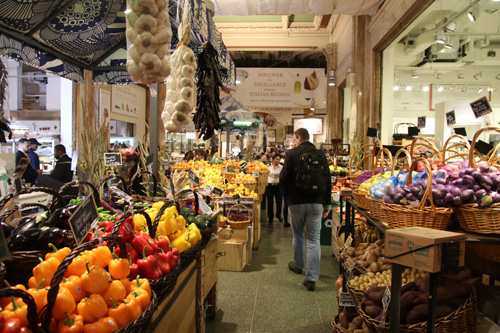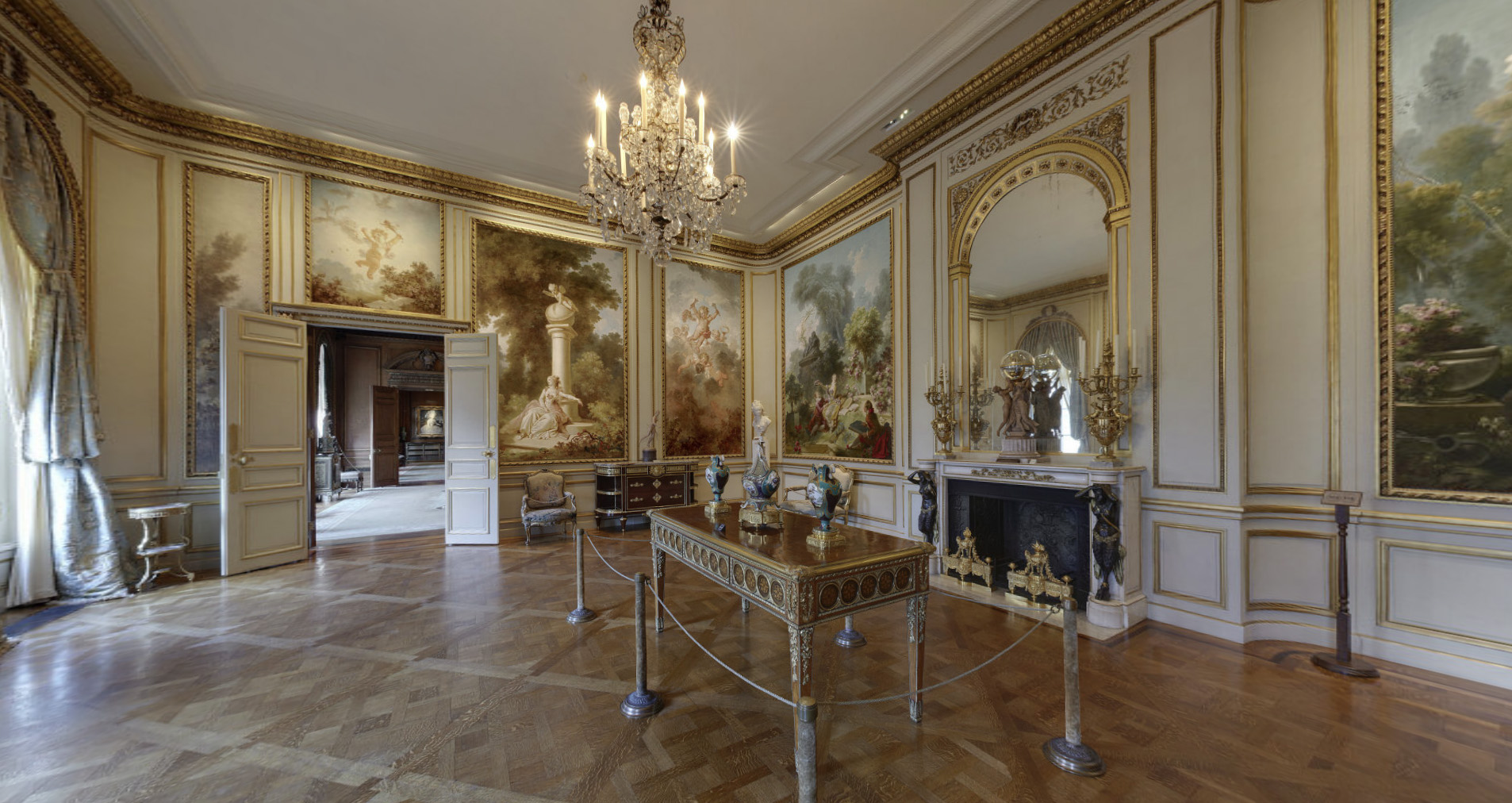 |
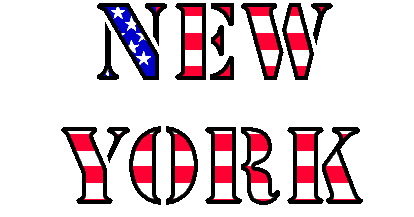 |
2016 |
Friday November 25, 2016
We arrive in
good time at Amsterdam Schiphol Airport. We drop off our luggage and
walk to the security checkpoint. There is a separate counter for Delta
flights. We answer the security questions and get stickers
on our passports. Then our carry on luggage is checked. We drink coffee
at Starbucks. At 11.50 boarding starts for our flight to Newark.
The flight goes smoothly. Halfway to Newark one of the passengers
gets medical problems and a doctor is called for. It turns out
that there is not one on board. Cabin crew is apparently ablehelp him
so that an emergency landing is not required. We arrive around 3pm
local time at Newark International Liberty Airport. I
mmigration
control is quite fast. We have to wait for our luggage. Then through
customs and on to the Airtrain. We buy tickets for NJ Transit to New York Penn Station from the
vending machine. The Airtrain takes us to the train station. We
transfer to the NJ Transit train to New York. The trip to New York
takes about half an hour. From Penn Station, we walk to the hotel.
That's a bit longer than expected and it starts to rain. At Morgans Hotel
on Madison Avenue @ E 38th Street, we have a reasonable room (for a not
so reasonable price) on the 11th floor. We take a rest. Around 6
o'clock we eat at Szechuan Gourmet restaurant
on 38th street, just off 5th Avenue. It is crowded with mostly Chinese
patrons. That must be a good sign. After the delicious dinner we
have a drink in the hotel bar. We to bed at 8 pm.
Weather: 11⁰ (52°F) and light rain
Saturday November 26, 2016
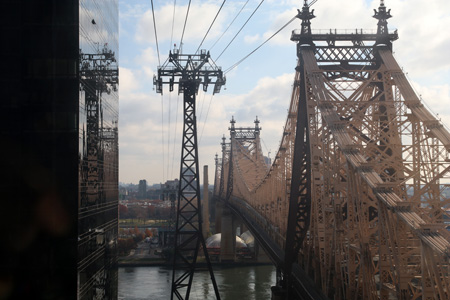 We
sleep fitfully and get up around 7am. Breakfast on weekends starts
promptly at 8am. It is a continental breakfast, so no cooked food items
and no meat. The buffet is laid out on the bar and we eat in the bar
area.
We
sleep fitfully and get up around 7am. Breakfast on weekends starts
promptly at 8am. It is a continental breakfast, so no cooked food items
and no meat. The buffet is laid out on the bar and we eat in the bar
area.
After breakfast we have coffee at Starbucks and we go to the AT&T store in the Empire State Building. I
buy a new SIM card and a
prepaid data plan (GoPhone, 2.5 GB, valid for 1 month for $ 25) for my
mobile hotspot, which I purchased in Las Vegas last year. A European
hotspot does not work on the US mobile networks. Service is quick and
excellent. Then we walk to Grand Central Station. Here we buy a MetroCard
with a 7 day pass for unlimited travel for $30 in the subway
station from the vending machine. We take the subway to 59th Street and
walk to the Roosevelt
Island Tram. With this cable car we go to
Roosevelt Island in the East River. The island was called Minnehanonck
in the original language of the Lenape Indians. The Dutch called the
Pig Island, but after the take over by the British it was called
Blackwell Island from 1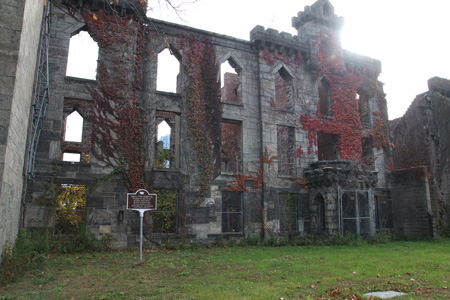 686
after the family who had a farm here until the early 19th century.
The great grandson of the first Blackwell built a wooden house in
1796, now known as Blackwell House, and it's the sixth oldest house in
New York. The city bought the island in 1828 and built a hospice, a
hospital, an asylum, a prison and a small pox hospital. The
island was called Wellfare Islandfrom 1921 . In 1973 the
institutions were closed and the island was renamed Roosevelt Island.
Now there is a residential area on the island, a hospital and the Franklin
Delano Roosevelt
Four Freedoms Park in memory of the former
president and governor (1882-1945), native of New York. We walk along
the quiet western side of the island with a beautiful view of
Manhattan. We pass the ruins of the smallpox hospital (designed
by James Renwick in 1856) and continue to the Roosevelt monument
by architect Louis Kahn. Kahn designed the monument between 1972 and
1974, but it was not completed until 2012. It
686
after the family who had a farm here until the early 19th century.
The great grandson of the first Blackwell built a wooden house in
1796, now known as Blackwell House, and it's the sixth oldest house in
New York. The city bought the island in 1828 and built a hospice, a
hospital, an asylum, a prison and a small pox hospital. The
island was called Wellfare Islandfrom 1921 . In 1973 the
institutions were closed and the island was renamed Roosevelt Island.
Now there is a residential area on the island, a hospital and the Franklin
Delano Roosevelt
Four Freedoms Park in memory of the former
president and governor (1882-1945), native of New York. We walk along
the quiet western side of the island with a beautiful view of
Manhattan. We pass the ruins of the smallpox hospital (designed
by James Renwick in 1856) and continue to the Roosevelt monument
by architect Louis Kahn. Kahn designed the monument between 1972 and
1974, but it was not completed until 2012. It 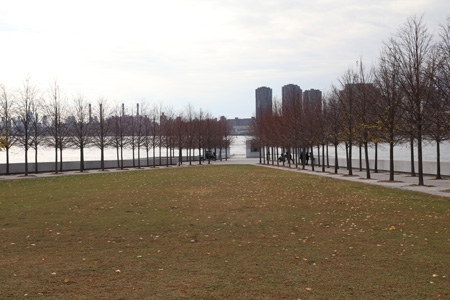 consists
of a lawn lined
with linden trees and a half-height wall with a bust of the president
at the end. Behind the bust stand the four freedoms that
Roosevelt postulated in 1941 in his 8th State of the Union are
chisseled: freedom of speech and worship,
freedom from fear and want. These four freedoms were the basis of
the Universal Declaration of Human Rights , which was adopted by
the UN in 1948. From here we have a nice view of the United Nations
headquarters. We walk back to the cable car station and take
consists
of a lawn lined
with linden trees and a half-height wall with a bust of the president
at the end. Behind the bust stand the four freedoms that
Roosevelt postulated in 1941 in his 8th State of the Union are
chisseled: freedom of speech and worship,
freedom from fear and want. These four freedoms were the basis of
the Universal Declaration of Human Rights , which was adopted by
the UN in 1948. From here we have a nice view of the United Nations
headquarters. We walk back to the cable car station and take 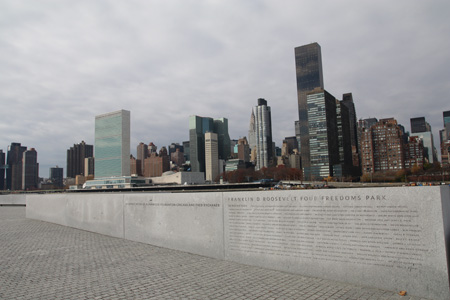 the free
island bus to the northern point. There is a - no longer in use -
lighthouse dating back to 1872. The lighthouse was used until 1940. We
have lunch at a sports bar before heading back to Manhattan taking the
subway (Line F) . The subway takes us to Rockefeller Centre and from
there we take the bus to the hotel.
the free
island bus to the northern point. There is a - no longer in use -
lighthouse dating back to 1872. The lighthouse was used until 1940. We
have lunch at a sports bar before heading back to Manhattan taking the
subway (Line F) . The subway takes us to Rockefeller Centre and from
there we take the bus to the hotel.
Around half past three we take the subway (line 4) to Brooklyn
(named after Breukelen in the Netherlands) to
visit the Brooklyn
Flea Market. During the summer months this hipster
flea market is held on the banks of the East River, in the DUMBO (Down
Under Manhattan Bridge Overpass) area. In the winter, the organisers
search 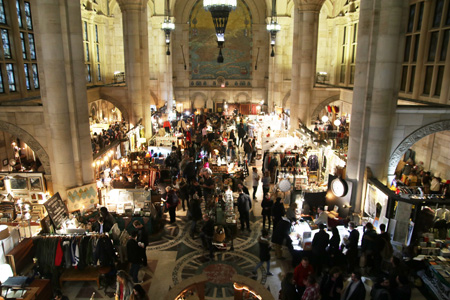 for
a suitable indoor location. This winter it is a former bank
building of the Williamsburg Savings
Bank at Hanson Place (subway Atlantic Avenue). Besides the 75 vendors
of the flea market, also 25 food stalls of the outdoor
Smorgasburg food market have been squeezed in. It is a cozy
incrowd venue for hip New York. We walk around the beautiful hall of
the bank, take pictures and have a beer in the bank vault in the
basement of the building. Then we take the subway to Franklin Avenue in
Brooklyn and walk down the Avenue to Bergen Street. Here's the beer
hall Berg’n. This was
started by the same group that organizes the flea
market. There are lots of beers on tap and food can be ordered at four
stalls. You get a pager that buzzes when the food is ready. Erik's
Filipino burger is disappointing, but my poutine tastes fine. We walk
back along Franklin Ave and drink coffee at Starbucks. We return
with line 4 (express) back to Grand Central
for
a suitable indoor location. This winter it is a former bank
building of the Williamsburg Savings
Bank at Hanson Place (subway Atlantic Avenue). Besides the 75 vendors
of the flea market, also 25 food stalls of the outdoor
Smorgasburg food market have been squeezed in. It is a cozy
incrowd venue for hip New York. We walk around the beautiful hall of
the bank, take pictures and have a beer in the bank vault in the
basement of the building. Then we take the subway to Franklin Avenue in
Brooklyn and walk down the Avenue to Bergen Street. Here's the beer
hall Berg’n. This was
started by the same group that organizes the flea
market. There are lots of beers on tap and food can be ordered at four
stalls. You get a pager that buzzes when the food is ready. Erik's
Filipino burger is disappointing, but my poutine tastes fine. We walk
back along Franklin Ave and drink coffee at Starbucks. We return
with line 4 (express) back to Grand Central
Weather: Cloudy 11⁰ (52°F)
Sunday November 27, 2016
We have coffee at the Starbu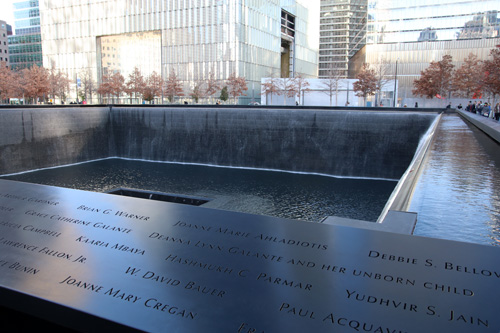 cks
on Madison Avenue & 35th. We walk to Herald Square, where we take
the subway line B to W 4th Street and change to line E to World Trade
Center. We first see the memorial for the terrorist attack of September
11, 2001. This consists of two large basins in the sites of the twin
towers of old the WTC. Along the edges of the basins the names of
the victims can be read. The pools consist of a waterfall along the
edges. The water runs out through a square hole in the middle of the
basin. Next we go to the One World
Trade Center,
also called the Freedom Tower, which replaces the Twin Towers. It is
now with its height of 1776 feet or 541 meters the Western
Hemisphere's tallest building and consists of a rectangular block,
where pieces are taken out. The tower has a square base and a square
roof, which are twisted relative to each other. After buying a ticket
for $ 37 per person we take the escalator down for a security check.
From there we go
cks
on Madison Avenue & 35th. We walk to Herald Square, where we take
the subway line B to W 4th Street and change to line E to World Trade
Center. We first see the memorial for the terrorist attack of September
11, 2001. This consists of two large basins in the sites of the twin
towers of old the WTC. Along the edges of the basins the names of
the victims can be read. The pools consist of a waterfall along the
edges. The water runs out through a square hole in the middle of the
basin. Next we go to the One World
Trade Center,
also called the Freedom Tower, which replaces the Twin Towers. It is
now with its height of 1776 feet or 541 meters the Western
Hemisphere's tallest building and consists of a rectangular block,
where pieces are taken out. The tower has a square base and a square
roof, which are twisted relative to each other. After buying a ticket
for $ 37 per person we take the escalator down for a security check.
From there we go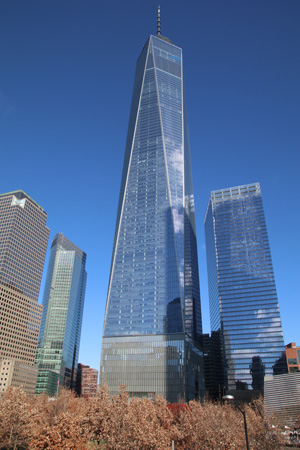 through a video presentation about the construction of the tower
towards the elevator. Going up in the elevator, the development of the
view of New York from the 15th century to the present is projected on
the elevator's walls. A beautiful sight. The perspective changes as we
go higher. Once upstairs our photo is taken (we can buy it for $ 30),
before we arrive at a video wall. A film is screened with images
from daily life in New York and at the end of the movie screen is
rolled up, and the real view is revealed. We can go through to the
observatory, where can we buy an iPad iwith interactive
through a video presentation about the construction of the tower
towards the elevator. Going up in the elevator, the development of the
view of New York from the 15th century to the present is projected on
the elevator's walls. A beautiful sight. The perspective changes as we
go higher. Once upstairs our photo is taken (we can buy it for $ 30),
before we arrive at a video wall. A film is screened with images
from daily life in New York and at the end of the movie screen is
rolled up, and the real view is revealed. We can go through to the
observatory, where can we buy an iPad iwith interactive 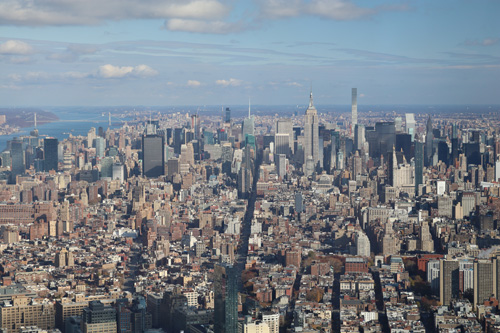 commentary
about what you see. It costs another $ 15. We give it a miss. The view
of the city and surrounding area is beautiful. The weather is clear and
we can see far in all directions. Initially (10am) it is fairly quiet,
but it soon the observatory gets a lot busier.
commentary
about what you see. It costs another $ 15. We give it a miss. The view
of the city and surrounding area is beautiful. The weather is clear and
we can see far in all directions. Initially (10am) it is fairly quiet,
but it soon the observatory gets a lot busier.
After we have seen everything we go down again. We take a taxi to South
Ferry, where we take the Staten
Island Ferry
to Staten Island. The crossing is free and offers stunning views of
Manhattan, Ellis Island and the Statue of Liberty. We are escorted by a
gun boat of the US Coast Guard. Sta ten
Island is a borough of New York City since 1898. The island
was seized on behalf of the Dutch East India Company by Henry Hudson in
1609. He founded a trading post and named it Staaten Eylant after the Staten Generaal,
the Assembly of the Dutch Republic. The island is twice as large as
Manhattan but with a population of just 500,000 people. We take
bus S74 to Richmond Historic Site.
The bus ride takes about half an hour. We pass New Dorp (Dutch for
Village). Historic Richmond is an outdoor museum with original
buildings from the 18th to 20th centuries. It is a bit disappointing.
We take the bus back and then the ferry to Manhattan. We have lunch
somewhere near South Ferry and take the subway # 4 from Bowling Green
back to the hotel.
ten
Island is a borough of New York City since 1898. The island
was seized on behalf of the Dutch East India Company by Henry Hudson in
1609. He founded a trading post and named it Staaten Eylant after the Staten Generaal,
the Assembly of the Dutch Republic. The island is twice as large as
Manhattan but with a population of just 500,000 people. We take
bus S74 to Richmond Historic Site.
The bus ride takes about half an hour. We pass New Dorp (Dutch for
Village). Historic Richmond is an outdoor museum with original
buildings from the 18th to 20th centuries. It is a bit disappointing.
We take the bus back and then the ferry to Manhattan. We have lunch
somewhere near South Ferry and take the subway # 4 from Bowling Green
back to the hotel.
We rest and around 5 o'clock we take the subway # 6 to Bleecker Street.
We walk from there to DBGB
Kitchen and Bar
on the Bowery. The Bowery is a street, a near the Lower East Side of
Manhattan. The word is a corruption of the Dutch word for farm (Boerderij).
DBGB is a bistro style project of the famous star chef Daniel Boulud.
We eat very good and affordable. From the restaurant we go to Chelsea
with line # 6, then L and then line E to 8th Avenue & 23rd. We
drink coffee at Starbucks and walk to the Baracuda bar. A quiet gay bar
in a side street (W 24th St), between 7th and 8th Avenues. It's kind of
stepping back in time. An old fashioned gay pub. After a beer we walk
to W19th Street to G-Lounge.
Which is a lot livelier with a transvestite bingo and gogo dancers.
After a beer we take line # 1 to Times Square. We step out to street
level to see the illuminated signs. Truly New York feel. Then back to
the hotel.
Weather: partly cloudy. 4-8⁰ C. 39-46°F.
Monday, November 28, 2016
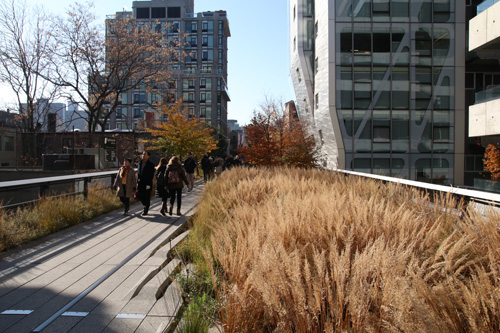 Today
we have a rendez-vous with Julie, a volunteer of the Big Apple Greeter Service.
This organization connects visitors to volunteers who want to show
their city from the perspective of the local. We meet her at the subway
station at 7th Ave & 34th St. Julie is in a wheelchair. She is
quite skillful with. We take the bus to Fulton Yard on the banks of the
Hudson River on the west side of Manhattan. Here the High Line begins,
a former elevated railway that has been transformed into a landscaped
park. Before we reach the ramp to the High Line we pass the terminus of
the cheap long distance buses to Boston and Philadelphia and some other
cities. Passengers stand in long lines waiting by the side of the road.
The High-line was built in the 20s, to get the freight trains off the
streets of New York. There were too many road deaths by collisions with
freight trains. Because a lot of business activity has left Manhattan
in the 1980s the tracks were no longer needed. In 1990 the last
train rode the tracks.
Today
we have a rendez-vous with Julie, a volunteer of the Big Apple Greeter Service.
This organization connects visitors to volunteers who want to show
their city from the perspective of the local. We meet her at the subway
station at 7th Ave & 34th St. Julie is in a wheelchair. She is
quite skillful with. We take the bus to Fulton Yard on the banks of the
Hudson River on the west side of Manhattan. Here the High Line begins,
a former elevated railway that has been transformed into a landscaped
park. Before we reach the ramp to the High Line we pass the terminus of
the cheap long distance buses to Boston and Philadelphia and some other
cities. Passengers stand in long lines waiting by the side of the road.
The High-line was built in the 20s, to get the freight trains off the
streets of New York. There were too many road deaths by collisions with
freight trains. Because a lot of business activity has left Manhattan
in the 1980s the tracks were no longer needed. In 1990 the last
train rode the tracks.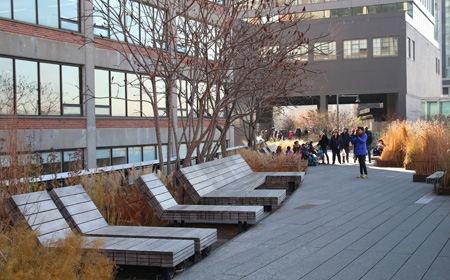 In 1999, the city wanted to demolish the railroad, but
two local residents founded an association "Friends of the High line"
that managed to accomplish the preservation of the High Line. The High
Line is landscaped with carefully chosen planting by Dutch garden
designer Piet Oudolf.
The old rails are incorporated into the pavement. Street furniture also
fits in well with the track. The line first winds around the rail yard
of Penn Station and passes buildings designed by Renzo Piano (New
Whitney Museum), Frank Gehry (IAC building)and many other famous
architects' work like Zahar Hadid (520 W 28th Condos). From the
overpass you have a whole different perspective on the city. Along the
line some nice attraction points have been built, such as the 10th
Avenue overlook. It is an amfitheater with a view of 10th Avenue.
Summer performances are given here. There is also lots of art on
the High Line. Most was commissioned by the association
In 1999, the city wanted to demolish the railroad, but
two local residents founded an association "Friends of the High line"
that managed to accomplish the preservation of the High Line. The High
Line is landscaped with carefully chosen planting by Dutch garden
designer Piet Oudolf.
The old rails are incorporated into the pavement. Street furniture also
fits in well with the track. The line first winds around the rail yard
of Penn Station and passes buildings designed by Renzo Piano (New
Whitney Museum), Frank Gehry (IAC building)and many other famous
architects' work like Zahar Hadid (520 W 28th Condos). From the
overpass you have a whole different perspective on the city. Along the
line some nice attraction points have been built, such as the 10th
Avenue overlook. It is an amfitheater with a view of 10th Avenue.
Summer performances are given here. There is also lots of art on
the High Line. Most was commissioned by the association 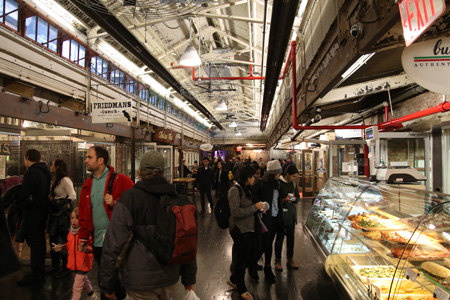 and is on temporary display. A stretch of the route runs
along the Hudson River. There are sunbeds overlooking the river. The
entire route is 1.4 miles long. At the Chelsea
Market
we leave the High Line. The Chelsea Market is located in the
former Nabisco biscuit factory. Lot of delicious food is sold here, but
also much is eaten on the spot. We sit down to drink coffee with a
pastry of Sarabeth.
Through large windows you can look into the bakery. We continue
and Julie shows us a nice pasta restaurant, Giovanni Rana.
It's past noon and we are tired. We decide to say goodbye to Julie and
to have lunch at Giovanni Rana. Rana is a pasta maker from the Veneto
in northern Italy, who once home-delivered his handmade pasta himself
to the customers. The company has expanded under his son into 38
countries and in 2012 opened the first restaurant here in Chelsea
Market.
and is on temporary display. A stretch of the route runs
along the Hudson River. There are sunbeds overlooking the river. The
entire route is 1.4 miles long. At the Chelsea
Market
we leave the High Line. The Chelsea Market is located in the
former Nabisco biscuit factory. Lot of delicious food is sold here, but
also much is eaten on the spot. We sit down to drink coffee with a
pastry of Sarabeth.
Through large windows you can look into the bakery. We continue
and Julie shows us a nice pasta restaurant, Giovanni Rana.
It's past noon and we are tired. We decide to say goodbye to Julie and
to have lunch at Giovanni Rana. Rana is a pasta maker from the Veneto
in northern Italy, who once home-delivered his handmade pasta himself
to the customers. The company has expanded under his son into 38
countries and in 2012 opened the first restaurant here in Chelsea
Market.
After the delicious lunch we take bus M14 to Union Square and from
there subway line # 4 to Grand Central. We rest in our hotel and at
half p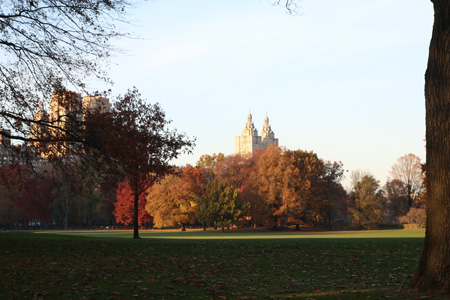 ast
three we hit the road again. We take line 7 to Times Square and there
line 1 to Columbus Circle at the southwest corner of Central Park. We
rent bikes at Central
Park Bike Tours. For $ 15 we rent a bike with gears for an hour. We
cycle around the whole of the park and stop here and there to take
pictures. It is fairly quiet and large parts of the route are closed to
car traffic. The sun shines on the beautiful autumn leaves on
ast
three we hit the road again. We take line 7 to Times Square and there
line 1 to Columbus Circle at the southwest corner of Central Park. We
rent bikes at Central
Park Bike Tours. For $ 15 we rent a bike with gears for an hour. We
cycle around the whole of the park and stop here and there to take
pictures. It is fairly quiet and large parts of the route are closed to
car traffic. The sun shines on the beautiful autumn leaves on 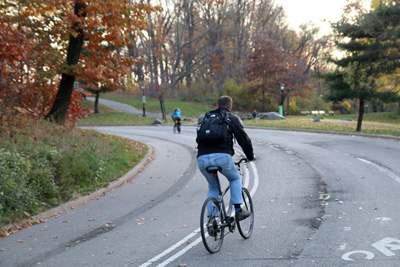 the trees and the beautiful residential buildings around
the park. The view
of the Jacqueline Kennedy Reservoir is great. After an hour we have
rounded the park and we return the bikes. We take the subway line A to
Times Sq and line 7 to Grand Central. We take some rest, because
we will spent the evening with Charles, our friend in New York. He
takes us to an Indonesian restaurant in Brooklyn, Selamat Pagi.
It's a little alternative place, but the food is reasonable. It's very
nice to see Charles again after so many years. Bas, Charles's partner
is also there. Charles is originally from Brooklyn and Bas from
Indonesia.
the trees and the beautiful residential buildings around
the park. The view
of the Jacqueline Kennedy Reservoir is great. After an hour we have
rounded the park and we return the bikes. We take the subway line A to
Times Sq and line 7 to Grand Central. We take some rest, because
we will spent the evening with Charles, our friend in New York. He
takes us to an Indonesian restaurant in Brooklyn, Selamat Pagi.
It's a little alternative place, but the food is reasonable. It's very
nice to see Charles again after so many years. Bas, Charles's partner
is also there. Charles is originally from Brooklyn and Bas from
Indonesia.
After dinner we take a taxi back to Manhattan.
Weather: sunny. 4-11°C / 39-52°F
Tuesday, November 29, 2016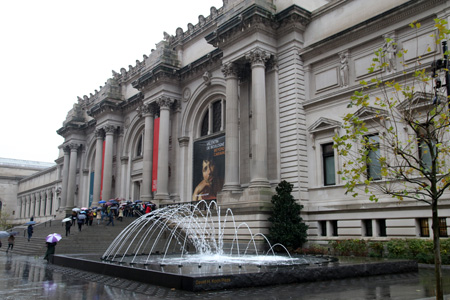
It's raining cats and dogs. After breakfast and coffee at Starbucks we take the metro line 6 to the Metropolitan Museum of Art.. We get off at 86th Street (& Lexington Avenue) and walk towards Central Park. We are too early and have to take shelter under a big umbrella before we join the line. At 10 pm, the museum opens and we get in line. The queue moves pretty fast. Once inside we pay for a ticket (suggested contribution is $25 but anything is welcome) and we leave our bags and coats in the cloakroom. The museum is huge and cannot be covered fully in less than a week. I selected a few highlights which we explore. We start with an Egyptian temple. It is Dendur temple and was donated by Egypt to the US for help in rescuing its archaeological heritage during the development of the Aswan dam. The temple takes up a separate w
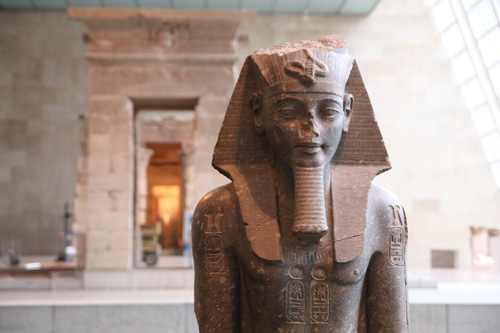 ing
in an annexe. Unfortunately, maintenance is being carried out, but it's
still impressive. Then we go to the American wing and we see paintings
of George Washington. Especially the famous painting by Emanuel Leutze,
"George Washington Crossing the Delaware
River"
is impressive. Then we go to paintings by Tiepolo. There is a huge
collection of French impressionists: Monet, Renoir, Van Gogh, Gauguin
... it seems endless. Monet's "Water Lilies" and "Bridge over a pond
with water lilies" and 18 others. Van Gogh for example, "Wheatfield with Cypresses"
and "Self Portrait with Straw Hat" back to back with "Potato
Peelers". We look also at a lot of Dutch work. Lots of Frans Hals,
Rembrandt, etc. A beautiful self-portrait from 1660 of Rembrandt and a portrait of Paul Verschuur, a former mayor of
our home town Rotterdam by Frans Hals! After some searching we find a
tiny small portrait of Erasmus of Rotterdam by Hans Holbein the Younger.
After a few hours we are full and we're off again. It is still raining
very hard. We take the subway back
ing
in an annexe. Unfortunately, maintenance is being carried out, but it's
still impressive. Then we go to the American wing and we see paintings
of George Washington. Especially the famous painting by Emanuel Leutze,
"George Washington Crossing the Delaware
River"
is impressive. Then we go to paintings by Tiepolo. There is a huge
collection of French impressionists: Monet, Renoir, Van Gogh, Gauguin
... it seems endless. Monet's "Water Lilies" and "Bridge over a pond
with water lilies" and 18 others. Van Gogh for example, "Wheatfield with Cypresses"
and "Self Portrait with Straw Hat" back to back with "Potato
Peelers". We look also at a lot of Dutch work. Lots of Frans Hals,
Rembrandt, etc. A beautiful self-portrait from 1660 of Rembrandt and a portrait of Paul Verschuur, a former mayor of
our home town Rotterdam by Frans Hals! After some searching we find a
tiny small portrait of Erasmus of Rotterdam by Hans Holbein the Younger.
After a few hours we are full and we're off again. It is still raining
very hard. We take the subway back 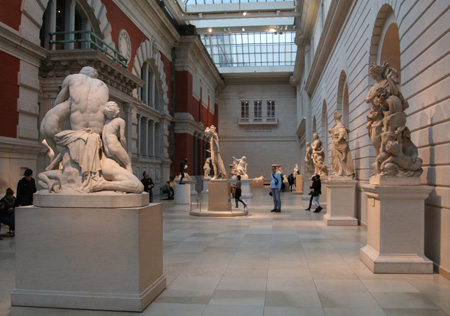 to the hotel and eat at a McDonald's down the street.
to the hotel and eat at a McDonald's down the street.We rest in and around 2:30pm we go to Macy's department store in Herald Square to buy some clothes. We find a Levi's for only $ 40. We go back to the hotel.
Around half past six we go get some fast food at Pret-a-Manger on Madison Ave before we we go by subway to Lincoln Center for the Performing Arts on the Upper West Side. Lincoln Center consists of six impressive marble and glass buildings from the 1960s. It replaced a slum. The residents moved northward and before the district was demolished the movie West Side Story, was filmed here, a film about a musical that took place in this slum. Lincoln Center is home to the New York City Ballet (at the David H. Koch Theater), the New York Philharmonic (at the David Geffen Hall), the New York Public Library for the Performing Arts, the Julian School of Music
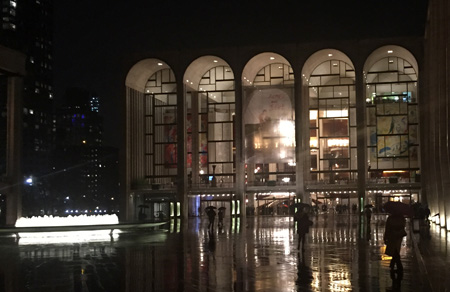 (where Dutch chief-conductor Jaap van Zweden of the New York
Philharmonic was educated), the Chamber Music Society (Alice Tully
Hall) and the Walter Reade Theater (foreign films). We arrive at the
Metropolitan Opera House, better known as "The Met."
Here we see the opera La Bohème by Pucini. We have seats in a box, that
we all to ourselves. The view is slightly limited. Nevertheless, the
tickets cost $ 130 each. The opera is beautiful with lovely arias.
There are two breaks. At half past ten it's over and we go back to the
subway. The rain has finally stopped.
(where Dutch chief-conductor Jaap van Zweden of the New York
Philharmonic was educated), the Chamber Music Society (Alice Tully
Hall) and the Walter Reade Theater (foreign films). We arrive at the
Metropolitan Opera House, better known as "The Met."
Here we see the opera La Bohème by Pucini. We have seats in a box, that
we all to ourselves. The view is slightly limited. Nevertheless, the
tickets cost $ 130 each. The opera is beautiful with lovely arias.
There are two breaks. At half past ten it's over and we go back to the
subway. The rain has finally stopped.Weather: very heavy rain, 14⁰C, 46°F.
Wednesday, November 30, 2016
We go by bus to the East Village. Until the 1980's the East Village
was a dangerous 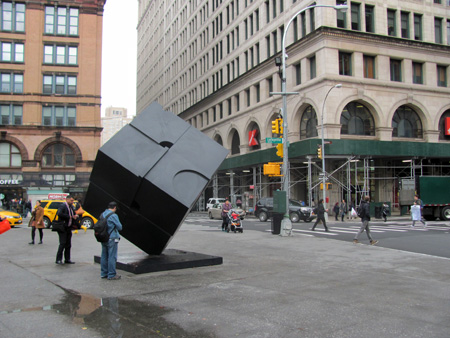 and
poor slum. As Greenwich Village or the West Village became increasingly
popular as a residential area and therefore more expensive the
artistic alternative crowd moved towards the East Village. Today,
housing prices here have shot up too, but it is still a fun and hip
neighborhood. Here we take a walk through the neighborhood. Very
different atmosphere than in Midtown. More alternative with many small
shops. We start at Astor Place cube called the Alamo by Bernard
Rosenthal from 1967. If you are strong enough, you can rotate it around
its axis. We also see here the back of the Cooper
Union
Building. This is a college for the disadvantaged, founded in 1859 by
the entrepreneur Peter Cooper. His statue stands in front of it on
Cooper Square. This part of the Village is the center of the Ukrainian
community in New York with its own museum around E 6th Street. A little
further down is the shiny New Academic Building. We continue to
Broadway and end up in the NoHo district. On Lafayette Street is the Public Theatre, from
where in summer the Shakespeare in the Park festival is organized.
and
poor slum. As Greenwich Village or the West Village became increasingly
popular as a residential area and therefore more expensive the
artistic alternative crowd moved towards the East Village. Today,
housing prices here have shot up too, but it is still a fun and hip
neighborhood. Here we take a walk through the neighborhood. Very
different atmosphere than in Midtown. More alternative with many small
shops. We start at Astor Place cube called the Alamo by Bernard
Rosenthal from 1967. If you are strong enough, you can rotate it around
its axis. We also see here the back of the Cooper
Union
Building. This is a college for the disadvantaged, founded in 1859 by
the entrepreneur Peter Cooper. His statue stands in front of it on
Cooper Square. This part of the Village is the center of the Ukrainian
community in New York with its own museum around E 6th Street. A little
further down is the shiny New Academic Building. We continue to
Broadway and end up in the NoHo district. On Lafayette Street is the Public Theatre, from
where in summer the Shakespeare in the Park festival is organized.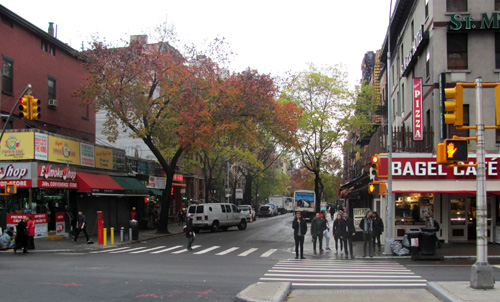 We move on to the St
Mark’s in the Bowery,
where Peter Stuyvesant is buried, He was the last Dutch governor of New
Amsterdam. He built a chapel here, which was near his farm. Late 18th
century a church was built over the original Dutch chapel and the
neoclassical facade was added in the 19th century. The Stuyvesant
tombstone is now in the wall, but we can not see it, because work
is being done around the church. We do see a bust of "Peg-leg Pete,"
which was not very popular with the settlers. We continue along 9th
Street to Tompkins Square, a park, where Charlie Parker once lived. We
have coffee at 9th
Street Espresso and then we take the M8 crosstown bus. We get off
at 6th Avenue, but
the connecting bus to 23rd Street does not show up. We therefore take a
cab to Eataly. This is an
Italian food emporium with plenty of dining options. The company is
founded by the renowned chef Mario Batali. It is crowded, but we can
get a table. We take the prix fixe lunch menu of $ 26 at Eatly's fish
restaurant Il Pesce. Raw fish for starters and then mussels for me.
Erik simple Caesar Salad is followed
We move on to the St
Mark’s in the Bowery,
where Peter Stuyvesant is buried, He was the last Dutch governor of New
Amsterdam. He built a chapel here, which was near his farm. Late 18th
century a church was built over the original Dutch chapel and the
neoclassical facade was added in the 19th century. The Stuyvesant
tombstone is now in the wall, but we can not see it, because work
is being done around the church. We do see a bust of "Peg-leg Pete,"
which was not very popular with the settlers. We continue along 9th
Street to Tompkins Square, a park, where Charlie Parker once lived. We
have coffee at 9th
Street Espresso and then we take the M8 crosstown bus. We get off
at 6th Avenue, but
the connecting bus to 23rd Street does not show up. We therefore take a
cab to Eataly. This is an
Italian food emporium with plenty of dining options. The company is
founded by the renowned chef Mario Batali. It is crowded, but we can
get a table. We take the prix fixe lunch menu of $ 26 at Eatly's fish
restaurant Il Pesce. Raw fish for starters and then mussels for me.
Erik simple Caesar Salad is followed
by a roll with fish of the day. After lunch we take the subway. It has started raining again.
We have a rest in our hotel. Around five o'clock we want to go to the Refinery hotel's rooftop bar. Unfortunately the rooftop bar appears to be closed today because of a private party. Or so we are told by a rather unsympathetic, gum chewing character, who refers us to another bar in the hotel. We go there and enjoy a cocktail. After the cocktail we take the subway line M to the MoMA (Museum of Modern Art) on 53rd street, where we have dinner at The Modern. We are welcomed with all honors in this excellent restaurant with two Michelin stars. We take the four-course menu that offers four choices for four courses. I start with Foie Gras Tart, followed by sea bass poached in olive oil. Then crispy Long Island duck and finally Honydew Melon crémeux (Feta and melon sorbet). It's all very tasty. We also take a wine pairing, which was well chosen by the sommelier. We take coffee after.
Then back to the subway and to the hotel.
Weather: dry morning, but around noon it starts to rain. At
times very hard. 9° C / 48°F.
Thursday, December 1st, 2016
After our last breakfast 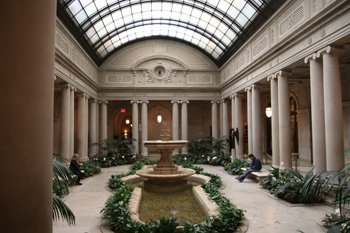 at the Morgans Hotel, we check out and
store our suitcases with the Bell Boy. We take the subway line 6 to
68th
Street. From the subway station on Lexington Ave we walk to Central
Park and then to the 70th street for a visit to the Frick
Collection.
The coal and steel magnate Frick was not only a ruthless businessman
also an avid art collector from Pennsylvania. In 1913 he moved to New
York. He came here to build a house on the edge of Central Park in
1914, which covers an entire housing block and above all had to
accommodate his vast art collection, which would be expanded
considerably. The works are not just pretty pictures, but a collection
of great masters from all periods and (mostly European) countries.
Rembrandt, Turner, Hals, Vermeer to name but a few, as well as
Tiepolo, El Greco, Bellini, Ducio, Gainsborough hang here. Also
imperssionists like Manet, Monet and Degas. Everything is beautifully
displayed in spacious halls and rooms. The paintings are n
at the Morgans Hotel, we check out and
store our suitcases with the Bell Boy. We take the subway line 6 to
68th
Street. From the subway station on Lexington Ave we walk to Central
Park and then to the 70th street for a visit to the Frick
Collection.
The coal and steel magnate Frick was not only a ruthless businessman
also an avid art collector from Pennsylvania. In 1913 he moved to New
York. He came here to build a house on the edge of Central Park in
1914, which covers an entire housing block and above all had to
accommodate his vast art collection, which would be expanded
considerably. The works are not just pretty pictures, but a collection
of great masters from all periods and (mostly European) countries.
Rembrandt, Turner, Hals, Vermeer to name but a few, as well as
Tiepolo, El Greco, Bellini, Ducio, Gainsborough hang here. Also
imperssionists like Manet, Monet and Degas. Everything is beautifully
displayed in spacious halls and rooms. The paintings are n
ot grouped by school or period, but fit in thematically with each other and also match the interior. The Fragonard Room is a special case. Frick bought the four-part series about love, after the children of JP Morgan - banker and art collector - put it up for sale. Frick did convert a salon to fit the paintings into his house. Unfortunately we can not take pictures in the building, except for the courtyard, which was built when the house was expanded after Frick's death creating extra rooms by incorporating a service road to the house.
In the basement is a temporary exhibition of the guilding artist
Pierre Gouthière (1732-1813) with some loans from the Louvre, combined
with Frick's own collection. In the west wing is an exhibition of
Meissen porcelain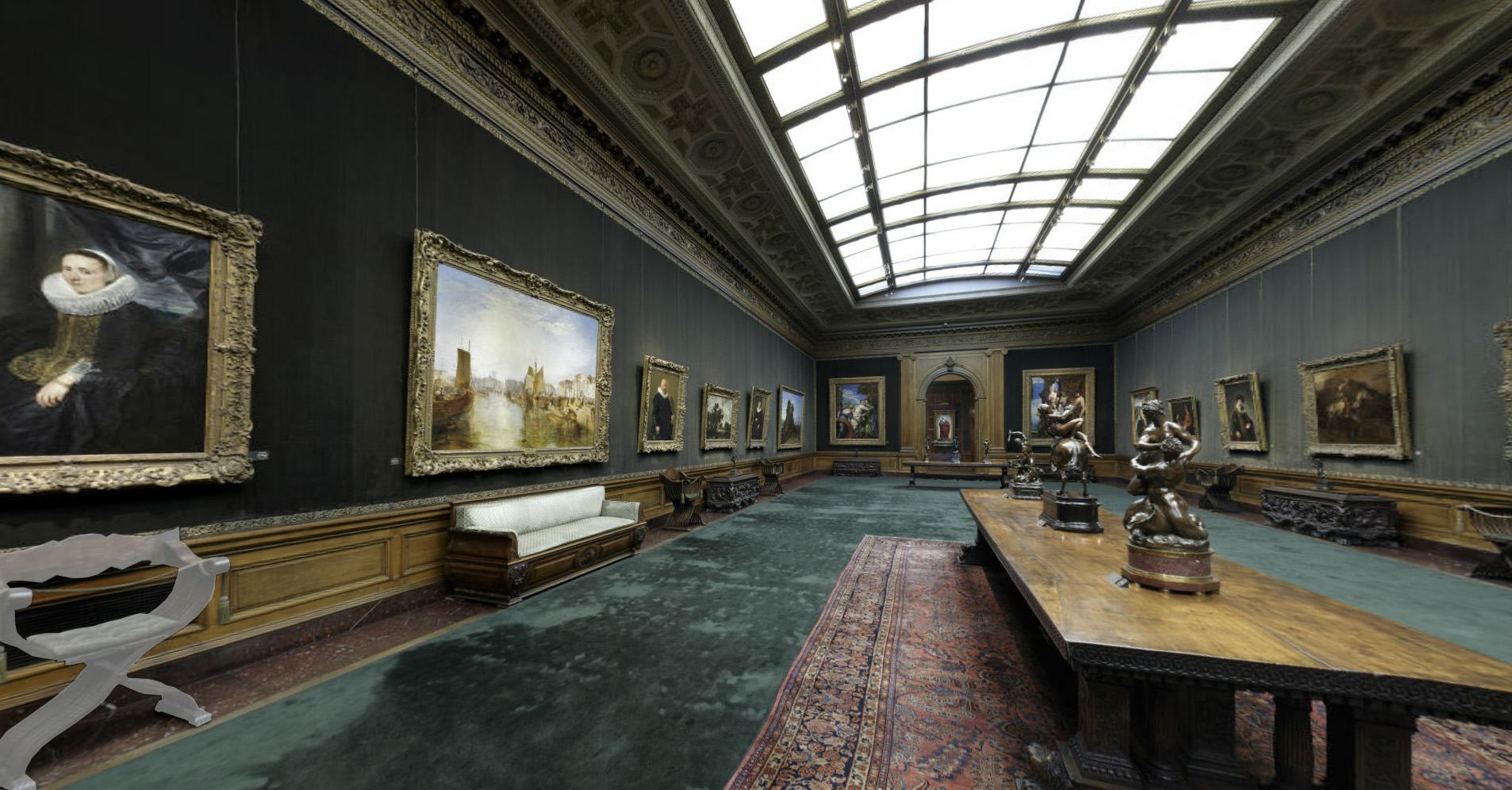 from the Arnhold collection.
from the Arnhold collection.
After all that beauty we take the bus to the Rockefeller center.
Yesterday the lights in the giant Christmas tree were switched on with
much fanfare during a live TV broadcast. Unfortunately, the
evening was pretty rained out. Now there are many people who come to
have their picture taken at the backdrop of the tree. The Rockefeller
Center is a complex of 19 buildings that has been developped between
1929
and 1940. Architecturally and zoning wise it forms a harmonious complex
of buildings entirely in Art Deco style. It is located in Midtown
Manhattan between
5th and 6th Avenue, between 48th and 51st streets. Oil tycoon John D.
Rockefeller started the construction in the middle of the economic
crisis that followed the stock market crash of 1929. Rockefeller went
through with and was saved by the advent of radio 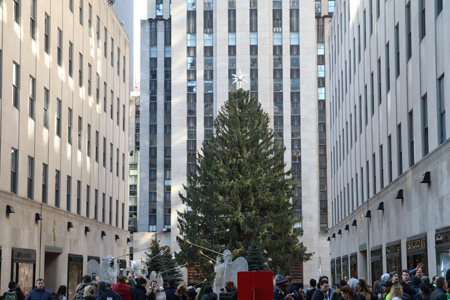 and
later on TV. The
major national radio and TV networks hired a lot of floor space for
their studios. The complex got its nickname Radio City this way. NBC is still
here. On weekdays the Today
Show is broadcast live from here since 1952.
Partly on the street in front of the studio. On Saturday night there is
a live broadcast of Saturday
Night Live since 1975. The Comcast Tower (formerly GE Tower)
is the tallest building in the complex at its foot we see the gilded
statue of
Prometheus, and in winter the famous ice skating rink. Opposite the
Rockefeller is the famous department store Saks
on Fifth Avenue. We take
a look inside, but are appalled by the level of prices. Besides Saks,
the Catholic St Patrick's Cathedral from 1878 in Gothic Revival style.
It was here that the funeral ceremony for John F. Kennedy was held in
1963. N
and
later on TV. The
major national radio and TV networks hired a lot of floor space for
their studios. The complex got its nickname Radio City this way. NBC is still
here. On weekdays the Today
Show is broadcast live from here since 1952.
Partly on the street in front of the studio. On Saturday night there is
a live broadcast of Saturday
Night Live since 1975. The Comcast Tower (formerly GE Tower)
is the tallest building in the complex at its foot we see the gilded
statue of
Prometheus, and in winter the famous ice skating rink. Opposite the
Rockefeller is the famous department store Saks
on Fifth Avenue. We take
a look inside, but are appalled by the level of prices. Besides Saks,
the Catholic St Patrick's Cathedral from 1878 in Gothic Revival style.
It was here that the funeral ceremony for John F. Kennedy was held in
1963. N
ext we walk down Fifth Avenue and have lunch in a side street, 49th Street very cheap and simple at the Liberty Deli and Pizza. Later we go to the big bookstore Barnes & Noble browsing for books.
We walk past the headquarters of the NY Public Library. This beautiful building from 1902 in the Beaux Arts style has one of the largest publicly accessible collections in the world. Opposite the library in the 40th street we go to Maison Kayser for tea and coffee with a pastry. Parisian chic in Midtown Manhattan. Very good.
We walk back to the hotel. We take a rest and then take a taxi to Penn Station. From there we take the Long Island Rail Road (LIRR) to Jamaica. A separate ticket is required for the LIRR. At Jamaica Station, we switch to the AirTrain to JFK airport. We drop off the luggage at the Delta counter and go through security. We eat a snack at a wine bar (incredibly expensive) and drink a coffee. Check-in is at 6:40 pm.
We depart at 7:45 for Amsterdam. We can see Manhattan clearly from the air. The skyscrapers are nicely lit, especially the Empire State Building. At Schiphol we are not arriving at a walkway gate, but need a bus to the terminal. Once we get through passport control, the suitcases are already on the conveyor belt. We can go straight to the train station, where our train departs at 9:55 for Rotterdam.
Weather: 12°C or 54°F. Cloudy but dry
